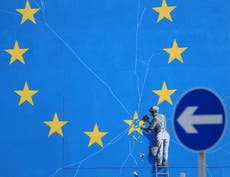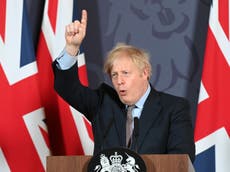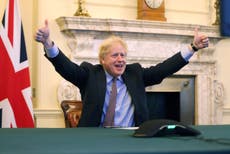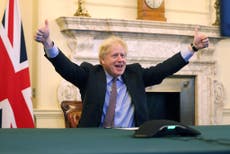This Brexit deal does not bring real sovereignty – whatever Boris Johnson wants you to believe
The fundamental conflict at the heart of our EU exit, between autonomy and economic prosperity, isn’t settled

Your support helps us to tell the story
From reproductive rights to climate change to Big Tech, The Independent is on the ground when the story is developing. Whether it's investigating the financials of Elon Musk's pro-Trump PAC or producing our latest documentary, 'The A Word', which shines a light on the American women fighting for reproductive rights, we know how important it is to parse out the facts from the messaging.
At such a critical moment in US history, we need reporters on the ground. Your donation allows us to keep sending journalists to speak to both sides of the story.
The Independent is trusted by Americans across the entire political spectrum. And unlike many other quality news outlets, we choose not to lock Americans out of our reporting and analysis with paywalls. We believe quality journalism should be available to everyone, paid for by those who can afford it.
Your support makes all the difference.We’ve been through nearly five years of Brexit, the debates, the broken friendships, the family feuds, the political chaos, and the neglect of almost every issue that affects 66 million people, all in an attempt to please 17.4 million who wanted completely incompatible things from Norway to no deal.
Instead of funding the NHS and increasing its capacity, we bought portable toilets for the M20 in preparation for a no-deal Brexit that never happened. Which do you think would have been more helpful in dealing with the coronavirus pandemic?
So what was the point? This trade deal is what replaces the treaties that made us members of the EU. So it better be worth it for those five years to make sense.
Let’s start with the basics. The main reason people voted for Brexit was about sovereignty, having full control of our laws. Now, reasonable Brexit voters would say that the reason behind that was because they wanted the UK to be able to change its laws in ways that improved the lives of UK citizens.
Economically, that means the UK becoming more competitive. And yet Boris Johnson just signed a deal that is specifically designed to ensure that the UK doesn’t gain a competitive advantage over the EU because the consequence will be tariffs on UK products. Johnson is celebrating the ability to significantly move away from EU law and, at the same time, celebrating that he got a zero-tariff deal. That doesn’t make sense if the moment you use the first one, you lose the second one.
It also doesn’t make sense given that Johnson previously said that no prime minister should ever sign a deal that involves the stipulation: “If [the EU passes] a new law in the future with which we in this country do not comply” the EU would have the “automatic right” to impose tariffs. And yet, subject to arbitration, this new Brexit deal gives the EU that right.
Unsurprisingly, that wasn’t the only thing Johnson said in his deal announcement that didn’t quite match reality. He repeated the claim he made during the 2016 referendum that Brexit would not create any barriers to trade. But that’s simply not true, because Michael Gove’s department has already said UK exporters will face an extra £7bn a year in costs over customs declarations alone.
He also said that his Brexit deal would mean more trade with the EU. I don’t even know how to argue against a claim like that. He’s saying that leaving a market is going to help us do more trade with that market. We had frictionless trade before. We won’t have it after. The extra customs declarations are just an appetiser. The loss of mutual recognition of product standards in certain areas and our gradual divergence away from EU regulations will, in my view, likely only make trade more expensive.
But crucially, it doesn’t get Brexit done. Fishing quotas will need to be renegotiated in five and a half years’ time. If we want to control more of our waters, EU negotiator Michel Barnier has said we will face tariffs selling the fish to the EU – which is where we currently sell half of our total catch. If, but more likely when, we significantly diverge from EU law, that will trigger further tariff negotiations.
So that fundamental conflict at the heart of Brexit between sovereignty and economic prosperity isn’t settled. It’s just being kicked down the road and we’ll deal with it sector by sector.
And what about the idea that Brexit was supposed to be a victory for working-class people against the elites? Will it be large corporations or small businesses that can afford all the increases in the cost of trade? Will it be multinational companies or tiny start-ups that will benefit from shifting to trading outside our continent more?
Johnson announced that his Brexit deal does not keep us in the Erasmus scheme, but reassured us that the UK would work to create partnerships that allow British students to study in other continents. I have a question. Does a flight to Florida cost more or less than a bus to Belgium? Free movement is called that for a reason.
When I studied law with French law, I spent my third year in a French university. Train to Plymouth: £30. Ferry to Roscoff: £60. Bus to Brest: €2. Tuition: free. My classmates who took law with American law had to prove they had £16,000 in the bank just to get a visa, and then pay for flights to Texas. I’m sure working-class kids are overjoyed they might gain more access to universities on the other side of the planet, at the expense of the ones they can actually afford to get to.
Therefore, the citizens of “Global Britain” will be competing against workforces in Europe who will have a lot more experience working internationally than we will.
And don’t give me the “that’s democracy” argument. I don’t mean to brag but having studied law, I can tell you that if you sign a four-word contract (eg Leave the European Union) and the other side turns it into a 2000-page treaty five years later, that doesn’t exactly count as legal consent. For example, the pro-Brexit DUP obviously oppose this deal because it puts a border down the Irish sea. And at the last election, the majority voted for parties with a second referendum as part of their platform.
In early June 2016 I recorded a video to explain why Brexit would be a disaster. I said we would end up having to choose between sticking to EU rules but not having a say, or making ourselves less economically competitive. And this week Johnson just signed a deal that says we either follow EU rules or face the prospect of tariffs with our main trade partner.
We’re about to enter another phase of political and economic crisis in a way that I warned about almost five years ago, and it’s happening during a pandemic that has already caused chaos at our ports. Merry Christmas.







Join our commenting forum
Join thought-provoking conversations, follow other Independent readers and see their replies
Comments